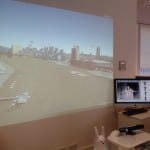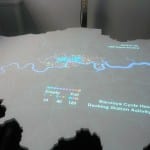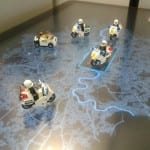Last night saw the first of the UCLDH digital excursions, at the Petrie Museum of Egyptian Archaeology .
UCLDH’s digital excursions are an opportunity to visit UCL departments that have specialist equipment and expertise of use to the field of digital humanities giving people a chance to look over interesting bits of kit and discuss the possibilities the gadgetry and skills presented provide to the field of digital humanities. So, last night we looked at the Petrie Museums use of 3D scanning in the museum environment..
The Petrie looks amazing, and it is stuffed full with artefacts dating back 5,000 years. Every available space is filled with a multitude of objects, so much that you cant take it all in, in one go. It’s overwhelming just how many artefacts there are in such a small space! over 80,000 objects in fact.
This hidden museum holds one of the world’s greatest collections of Egyptian and Sudanese archaeology, ranging over 7000 years from prehistory through Pharaonic to Islamic times. The Petrie is committed toward public accessibility for its collection, particularly via online access; the entire collection of 80,000 objects is now online with images, which has led to several projects to digitise Egyptian collections in small UK museums The museum also has a Digital Egypt teaching resource. Now they are working in partnership on 3D Encounters, with the Ireland-based multimedia company IET (Íomhánna Éigipteach Teoranta) to develop high-end 3D scanning, modelling and presentational resources. Its a really interesting project and the webiste is quite fun.
The project has only just started, but the kit is pretty cool. The aim is to digitally record themed selections of objects and make them more accessible by telling their ‘stories’. The project will also digitally recreate some of the more rare & fragile artefacts, replicated for public handling and as a means of monitoring decay. There is something really compelling about being able to manipulate digital objects and being able to learn more about them in such a tactile (albeit virtual) way, so I cant wait to see the end product.
A good night out. Couldn’t make the Petrie? Don’t worry, the next Digital Excursion is scheduled for April and will be hosted by The Wellcome Trust Centre for the History of Medicine at the Wellcome Collection. More details soon.

 Close
Close











